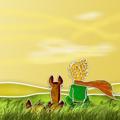Steel Rabbit reviewed Animal farm by George Orwell
Boy! Orwell really doesn't like Stalin.
3 stars
As a piece of writing, it's engaging, easy to read, and well crafted. This is no surprise, as Orwell's a great writer that—though he lacks subtlety—is able to deliver his thoughts well without the reader feeling written down to.
I see a lot of reviews state that this book is "prescient"—much like they say about another of his: 1984—but this isn't in the way people think. Though Orwell died in the '50s, Animal Farm is less-prescient about our sudden turn to authoritarianism, and more prescient towards the fall of the Soviet Union. While Orwell intended Napoleon to be a caricature of Stalin, what we get instead is a composite image of all the leaders of the Soviet Union to some degree or another. I imagine the Napoleon of the last chapter to be more Yeltsin than Stalin, though there's no way Orwell could've known that.
This ties into …
As a piece of writing, it's engaging, easy to read, and well crafted. This is no surprise, as Orwell's a great writer that—though he lacks subtlety—is able to deliver his thoughts well without the reader feeling written down to.
I see a lot of reviews state that this book is "prescient"—much like they say about another of his: 1984—but this isn't in the way people think. Though Orwell died in the '50s, Animal Farm is less-prescient about our sudden turn to authoritarianism, and more prescient towards the fall of the Soviet Union. While Orwell intended Napoleon to be a caricature of Stalin, what we get instead is a composite image of all the leaders of the Soviet Union to some degree or another. I imagine the Napoleon of the last chapter to be more Yeltsin than Stalin, though there's no way Orwell could've known that.
This ties into my critiques of the book, mainly that it ignores the material conditions that went into the formation of the USSR, and indeed goes against the very core of the idea of Marxism. In the beginning, the rebellion is dreamed up by Major. Though this is clearly a Marx analog, it goes against Marx's theory of dialectical or historical materialism by literally attributing Major's theory to a dream (the realm of idealism). Moving further into the story we see that Napoleon's betrayal of the revolution is clearly Orwell's opinion on Stalinism, but similarly arising from the ideal. Napoleon conquers the revolution because he wants to, allies with the humans out of self-interest, and joins them out of a furthering of self-interest into hedonism (a wild comparison to make in 1944, when this was written).
While there are criticisms to be made of Stalin and Stalinism, the idea that the decisions he and the party made weren't due (or due in small amounts) to the fact that they had just made it out of a world war, a civil war, a violent revolution, had every imperialist nation arrayed against them, were trying to industrialize a feudal nation, and were trying to implement a philosophy and form of governance that had never been attempted at a national scale, is blinkered.
I can't help but think that much of what was behind this novel(la) was inspired by Orwell's experiences in the Spanish Civil War, a conflict that would affect an idealist man in ways I can't fathom. Overall, it's an interesting read if you have nothing going on in an afternoon and it's on the shelf at a place you're staying at, but it's nothing to base an outlook on, political or philosophical.











